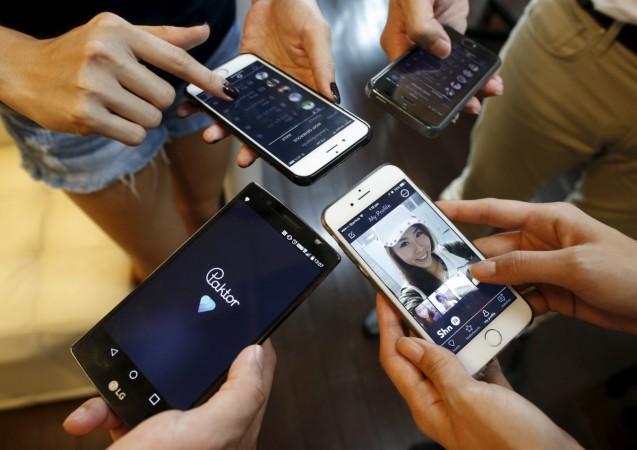
Mobile dating app, Paktor, is popular in South East Asia with about 20 million users. The app is currently available in Singapore, Malaysia, Taiwan, Japan, Korea, Vietnam, Thailand and Indonesia. And is helping build relationships, be it platonic or romantic. Paktor was recently in news for acquiring a controlling stake in the Asian livestreaming app, 17. Paktor Group CEO, Joseph Phua has been appointed as CEO of 17 Media while Jefferey Huang will remain its chairman. In October, Paktor had raised $32.5 million in new funding to expand into mobile entertainment.
In an exclusive chat with International Business Times, India (IBT), Joseph Phua, CEO and co-founder of Paktor, speaks about his business plans and business trends. Here are the edited excerpts from the interview:
IBT: Like most dating apps these days, are you only targeting users within the age group of 18-32? Do you think that there is no market for those above 32?
Joseph Phua: For Paktor app, we don't only target 18-32 years old. Everyone of any age are most welcome to use Paktor, just that we noticed that the majority of our users fall between 25- 35 years old.
IBT: What are your first time users like?
Joseph Phua: There are 20 million users globally and the largest age group who access Paktor app for the first time are between 25- 30 years of age.
IBT: What is the success match percentage of users using your app? Has there been any complaint after the match?
Joseph Phua: We do not share information match percentage, swipe rate etc.
Fortunately, so far there have been no complains from users who got matched through Paktor. On the other hand, we often receive emails and messages from our users who thank us for helping them find their partners and invite us to their weddings.
IBT: With increase in hacking cases around the world, how safe is your app from such attacks?
Joseph Phua: We follow the security best practise guidelines as recommended by the industry experts. Paktor requires users to sign up via their Facebook accounts, but the caveat is to have at least 50 friends before anyone is eligible for user registration. We also leverage on our in-house proprietary technology to weed out fake user profiles algorithmically – such as detection of abnormal user swiping behaviour, rude user profile pictures to name a few.
Last but not least, Paktor users are also empowered to make an anonymous report on other users. Community-generated reports have been most effective so far.
IBT: What is the revenue model and how important is it for a dating app to offer subscription based services? How many paid users do you have?
Joseph Phua: Currently Paktor app is on a 'freemium model', where it is free to install and use the app. Users who would like to have a better match may have the option to subscribe as Paktor's premium member. As a Paktor app premium member, one gets to enjoy:
1. Daily 1,000 Paktor points reload
2. Paktor points work like a virtual currency. With Paktor points,
- Premium member may send direct match requests and gifts to other users
- Premium member may unlock special filters such as height, job and education level
- Premium member may access the users who have viewed and liked their Paktor profile
The other revenue source comes from Paktor app's brand advertising solution, where advertisers may leverage the app's native infrastructure to run creative and highly targeted campaigns. We see this as a powerful and non-intrusive solution for marketers to tap into because swiping has become second nature to the way digital natives interact and relate with mobile content. Some of the past campaigns that Paktor has worked on include Warner Bros. film promotion for 'How to Be Single', Asia Pacific Breweries' Strongbow cider and most recently, Universal Studio Singapore's Halloween Horror Nights 6 at Resorts World Sentosa (RWS) this coming October.
IBT: Can you share details about the nature of gifts that come with Paktor points?
Joseph Phua: The nature of Paktor gifts are typically in virtual form. Everybody loves to receive gifts and this feature serves to help our users indicate interest by:
- Breaking the ice and initiating a conversation with potential match
- Thanking the other user for giving a right swipe that results in a match
- Showing appreciation during chats
Beyond virtual gifts, we also ran a special O2O (online to offline) gifting concept for this year's Valentine's Day in Singapore and Taiwan. Named Paktor Tokens, sender may decide on the quantity of roses to deliver and Paktor team facilitated the delivery to ensure recipient receives the bouquet timely.
IBT: Internet is full of dating apps and sites, how different is Paktor app from other similar apps like Tinder, Cupid and so on?
Joseph Phua: International players have traditionally struggled in South East Asia for multiple reasons. Sometimes it is due to the fragmented nature of the region that has multiple languages and cultures that hinders them. At Paktor, we think global and act local. Our approach is tailored to the localisation of our product in each market. The Paktor app caters to locals because we understand the needs and uniqueness of the local people and culture better. We tap on this localised knowledge and introduce features that locals want thereby gaining appeal amongst the local audience in any country in the region.
IBT: India provides you with a huge market, with people who are young and upwardly mobile, how less likely are you to not introduce your app in India in the near future?
Joseph Phua: Online dating is a huge market with a fundamental trend into mobile dating apps and expansion remains a top priority for Paktor. The India market holds plenty of opportunities for Paktor and we don't dismiss the possibility of entering India. However, our current focus is on North Asia – namely Korea and Japan.
















